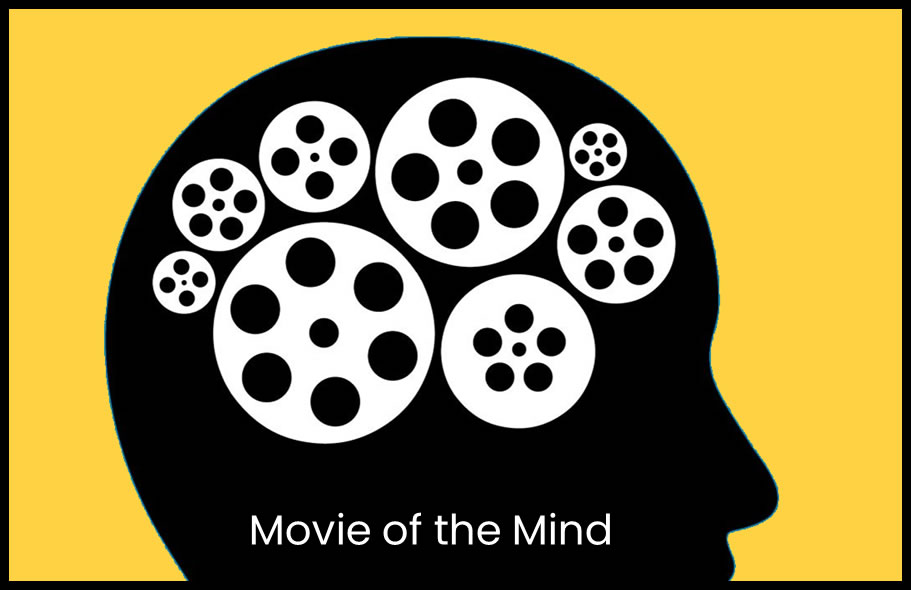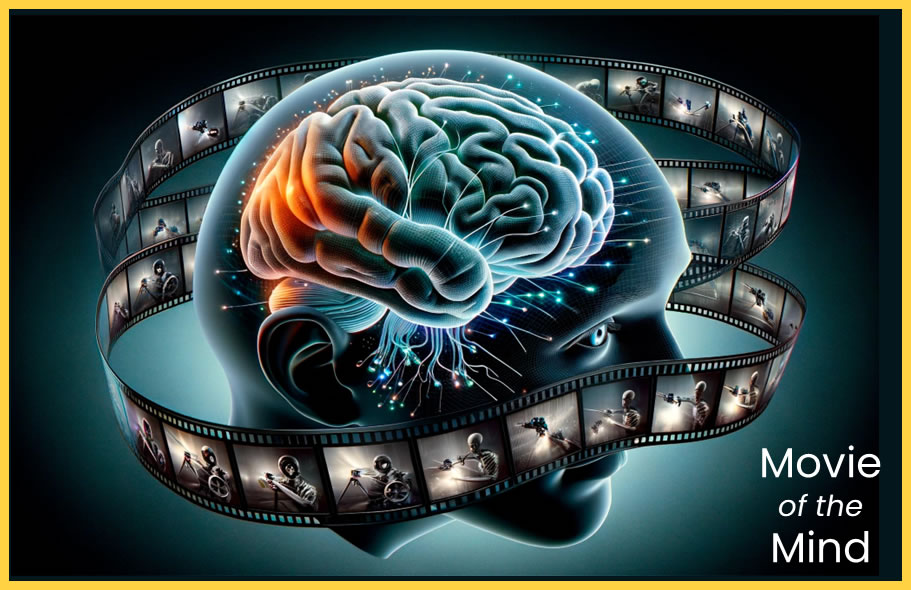Movie of the Mind - Let the Script Change
“Meditation is not what you think. You sit in absolute silence and your mind starts replaying all your movies. During that process, you become so familiar with the scripts you keep in your life that you end up getting sick of them. Then you realize that the person you think you are is just a complicated script you spend most of your energy on. Upon closer examination, you discover that your personality sucks. And that’s because it’s not really you. If you feel intimidated enough by that personality, spontaneously allow it to fade away. And then, if you’re lucky, you can experience yourself without the distortion of that personality.”
Your personality isn’t fixed. It’s flexible—malleable even—and deeply influenced by your goals, your environment, and your choices. What you call your “personality” might just be an inherited script, an accumulation of reactions, coping mechanisms, and social conditioning masquerading as identity.Old scripts—the ones written by trauma, repetition, or external labels—aren’t permanent. They’re just the most rehearsed lines in your mind’s movie.
Everyone has a movie playing in their mind. It might be a looping memory, a dreamlike future, or a mix of both. This internal movie shapes the way we see the world, how we respond to life, and what we believe is possible.
As children, we easily imagined new worlds. A stick became a sword, a spaceship, or a stage prop. But over time, imagination often gets shut down. Many of us were told to “be realistic.” The movie of the mind became blurry, muted, or dismissed.
Still, the movie never really stops. It keeps running — sometimes just below the surface — scripting stories about who we are and how the world works.
This movie isn't just fantasy. It’s a quiet force that fuels creativity, guides decisions, and colors emotional memory. It can hold us back, or it can move us forward.
When we pay attention, we see how imagination directs the scenes: the way we interpret people’s actions, how we anticipate future moments, how we replay old conversations. Even fear has its own movie reel — sometimes more intense than reality itself.
Your personality isn’t fixed. It’s flexible—malleable even—and deeply influenced by your goals, your environment, and your choices. Old scripts—the ones written by trauma, repetition, or external labels—aren’t permanent. They’re just the most rehearsed lines in your mind’s movie.
The movie of the mind isn’t always accurate, but it’s always active. And like any good film, it can be edited. We can reframe the plot, recast roles, and shift the tone. That’s the power of becoming aware of it..
Imagination is not childish. It’s how we innovate, adapt, and find meaning. Whether we realize it or not, we’re constantly writing the next scene.
The movie of the mind isn’t always accurate, but it’s always active. And like any good film, it can be edited. We can reframe the plot, recast roles, and shift the tone. That’s the power of becoming aware of it..
The movie of the mind is ongoing. The question is — are we watching it, directing it, or just letting it run without a script?
You're the Casting Director, Rewrite Your Role
Labels like “introvert,” “procrastinator,” or “anxious person” are not facts. They’re roles you’ve played in your movie of the mind. Stories you’ve repeated. But those identities can be revised and the movie role you play rewritten. You don’t have to stay loyal to a version of yourself that no longer fits.
The self is not defined by the past—it’s directed by the future. Choose your future self, and let that vision shape how you act, speak, and think today.
“The best way to predict your future is to create it.”
Environment: The Set Design of Your Personal Movie
“Your environment is not neutral—it either supports or sabotages your next chapter.”
In the movie of your mind, your environment is your set design. It determines the tone of your scenes, the space where your behavior plays out. Even subtle things—who’s in the room, what’s on your wall, the way your morning begins—cue your next action.
“You are the director of your life’s environment. Rewrite the scene. Redesign the set.”
Your physical, emotional, and digital surroundings either hold you to the past or help you rise into the future. Don’t leave your set to chance. Build an environment that reinforces the version of yourself you’re choosing to become.
“You are not stuck. You’re just rehearsing the same scene on the same stage. Try a new location.”
Mastering the 5 Core Values: The YEARN Advantage by Sherrie Rose
Movie Vision: Becoming Your Future Self
Visualization is not a passive practice is a powerful tool for self-creation your own personal life's moie. When you visualize the person you want to become, you begin to align your actions with that image. The brain doesn’t distinguish between vividly imagined experiences and real ones, which is why this practice is so effective in creating change. A movie of the mind that you imagine can be like a digital representation of a physical vision board that help see and FEEL what it is you want.
“What the mind can conceive and believe, it can achieve.”
Use visualization as a blueprint for your new identity. See yourself living in alignment with your goals, and let that movie of the mind guide every decision you make. Check out source links below and find Hal Hershfield who came up with Future Self term.
When you start to imagine a future self, you aren’t escaping the present—you’re editing the script.
Rather than excavate identity from the ruins of the past, point your gaze forward. Let who you want to become shape who you are today. When you build toward something larger than your current self, your personality adapts to fit the role.
The cast matters too. Environments ( mentioned above), relationships ( mentioned below), habits—these are your backstage crew. If they’re misaligned with your growth, the performance suffers. But when they’re in sync with your future, they reinforce your becoming..
You are the author, the scriptwriter, not the character in the movie.
Write a self—narrative that doesn’t echo wounds, but honors healing. Let trauma inform, not define. Reframe your story not with denial, but with deliberate intention.
The future isn’t just something to arrive at—it’s something to inhabit now.
Use enhavim as your guide to visualize your future. Enhavim is purpose and mission led by vision. Start with vision. Picture yourself living in alignment and see it clearly, in detail. Let that mental movie of the mind help with your choices and direct your actions.
People Influence Your Identity and your Movie Role
“You are the average of the five people you spend the most time with.”
The people around you act as mirrors, casting reflections into the movie of the mind. Each relationship becomes a supporting role or background influence in the narrative of who you are becoming. When you surround yourself with people who challenge, support, and believe in you, they help you see yourself more clearly and often, more generously. These are your relationship riches—the people who add depth, growth, and strength to your daily movie script.
“The people you surround yourself with will either lift you up or pull you down. Choose wisely.”
Let Go and Update Your Old Movie Role
We all carry old beliefs that no longer serve us. Whether they’re about who we are, what we can achieve, or what we deserve, these beliefs shape our identity. They become scenes in the movie of the mind—quiet scripts we replay without noticing. To become your future self, you must be willing to release these limiting beliefs.
“The only limit to our realization of tomorrow is our doubts of today.”
The beliefs you hold about yourself are the foundation of your personality. If you’re ready to change, it’s time to rewrite the movie of the mind—tearing down the old belief system and building something stronger.
James Clear's principles from Atomic Habits offer valuable insights into transforming your beliefs and behaviors. By focusing on small, incremental changes, you can start to reprogram the movie of the mind. Rather than making drastic shifts, start by adding one new, positive habit and letting it compound over time.
Clear emphasizes the idea of identity-based habits. To change your habits, you need to shift your identity first. As you begin to view yourself as the type of person who embraces change and growth, your actions will follow, and you’ll begin to see new scenes unfold in the movie of your mind.
To become the person you want to be, make small, consistent changes that align with the future you envision. Start with tiny actions, and let them build momentum until your new identity becomes a permanent feature of your mental movie.
Ways to Begin Rewriting the Script of your Movie
-
Set goals that challenge your current identity to remove old labels you've accepted.
→ They stretch your self-concept, like trying on new emotional clothes. -
Visualize your future self regularly to reinforce
→ Let imagination train your mind toward possibility. See your new role and take action toward it.
- Surround yourself with people who encourage the future you want.
→ Invest in Relationship Riches. - Journal a self-narrative that aligns with who you’re becoming
→ Keep your words focused on growth, curiosity, and healing. -
Reframe your past as a source of learning, not limitation, see the lessons
→ You don’t have to deny what happened to you. But reinterpret it in a way that honors your resilience and direction. -
Curate environments that reinforce your evolution
→ Books, music, mentors, rituals—all influence your identity scaffolding. -
Design with the future in mind as your Masterwork
→ Your masterwork is your imprint across time.

Movie of the Mind Sources
P.S. The visuals pictured on the “movieofthemind.com" website show old-school movie reels and celluloid film, but you know most films today are entirely digital, not the nostalgic images from a different era. Here, we're talking about the “movie of the mind.” It’s all happening in the neocortex and gray matter of the brain, just pure mental projection, where even the word projection brings back the image of an old school movie projector.
